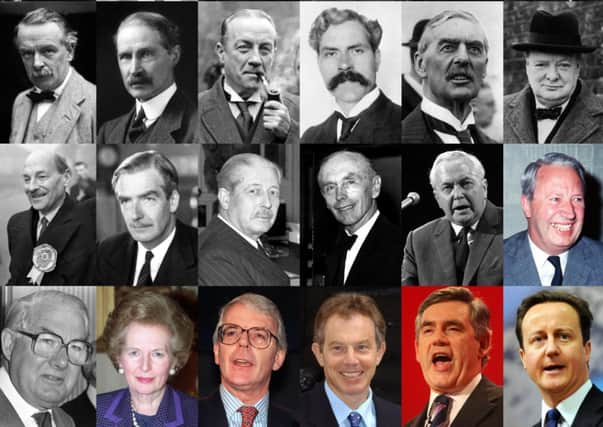Bernard Ingham: Look beyond the stereotypes and the fossils of the past


If so, I am amazed at my perspicacity because the 14th earl, as he was before he became Prime Minister, was truly the last of a line.
He marked the end of the aristocracy’s hold on power. Since then we have had nothing but commoners in No 10 – Harold Wilson, Ted Heath, Jim Callaghan, Margaret Thatcher, John Major, Tony Blair, Gordon Brown and now David Cameron.
Advertisement
Hide AdAdvertisement
Hide AdOf course, some of them are or were commoner than others, but that is by the way.
Yet, 50 years on, you might think that the Tory Party was still a bunch of chinless, gradgrind Bullingdon Clubbers, determined to trample the plebs underfoot and, of course, rob them of their National Health Service.
This caricature of the modern Tory, most of whom were born with at best a stainless steel spoon in their mouths, is as astonishing as the Labour Party’s nostalgia for the supposed communal concern of the post-war economic and political consensus that Margaret Thatcher broke in 1979.
If losing 128m working days to strikes during the 1970s on top of Britain’s “I’m all right Jack” de-industrialisation of the 1960s represented communal concern, then I’m a Kalahari Bushman.
Advertisement
Hide AdAdvertisement
Hide AdDon’t forget I covered the whole of this damaging period in our history when ordinary workers became pawns in the class war either as a labour correspondent or working for both Labour and Conservative governments that tried to reform industrial relations.
It beggars belief that the unions which beggared Britain are still Labour’s paymasters and actually put Ed Miliband in office if not yet in power. On this evidence, Labour is having far more difficulty escaping from its past than the Conservatives.
Tony Blair got something right when he tried to hold Labour to the centre ground and resisted pressure statutorily to de-arm the state and re-arm the unions.
Which brings me to my earnest pre-election plea to the political parties. If we are to have another 91 days electioneering – as inevitably we are – let it be based on reality, not myth; rationality instead of fevered imagination.
Advertisement
Hide AdAdvertisement
Hide AdYou may well think that I am off my rocker if I see the remotest chance of reasoned debate in what has been written off as a dirty campaign even before much mud has been flung.
In fact, I recognise I am probably baying for the Moon. But as reasonable people we can at least try to prevent some of the manufactured mud from sticking.
First, leaving aside the various nationalist parties, I do not accept that any of the others – Tory, Labour, Liberal Democrats, UK Independence Party or Green – is in business to damage the UK. On the contrary, each would argue passionately that it exists to improve the lot of the people.
This being so, we have to look as dispassionately as we can at their manifestos and the beliefs and attitudes that lie behind them. In the light of history, what chance does their programme have of success? To what extent do they seek to unify the nation or pander to vested interests?
Advertisement
Hide AdAdvertisement
Hide AdDo we really need another coalition, even acknowledging that the Lib Dems over the past five years have facilitated a recovery – albeit too slow and incomplete – from an unsustainable budget deficit?
Most important of all, given the muck that will be flying around, we need to ask ourselves how far the current caricatures of the parties are valid.
For my part, I do not look askance at those who seek to balance the nation’s books as soon as possible.
Matching expenditure to income is a basic necessity for the good of the people. I find it humanitarian to reduce benefits and so encourage work when, by common consent, the welfare state has been corrupted into encouraging idleness.
Advertisement
Hide AdAdvertisement
Hide AdA state education system as variable in performance as the English weather clearly needs to be improved. One which fails to equip youngsters for work is a dangerous economic and social liability.
As for the sacred cow called the NHS, the risk here is not that individual parties will starve it of funds but that they will throw money at it instead of improving its performance.
As for Europe, it is a major threat to our economic recovery and a rational nation would seek to detach itself to find its own salvation in globalised trade.
If we ignore all this, we could become as fossilised as I found Sir Alec.